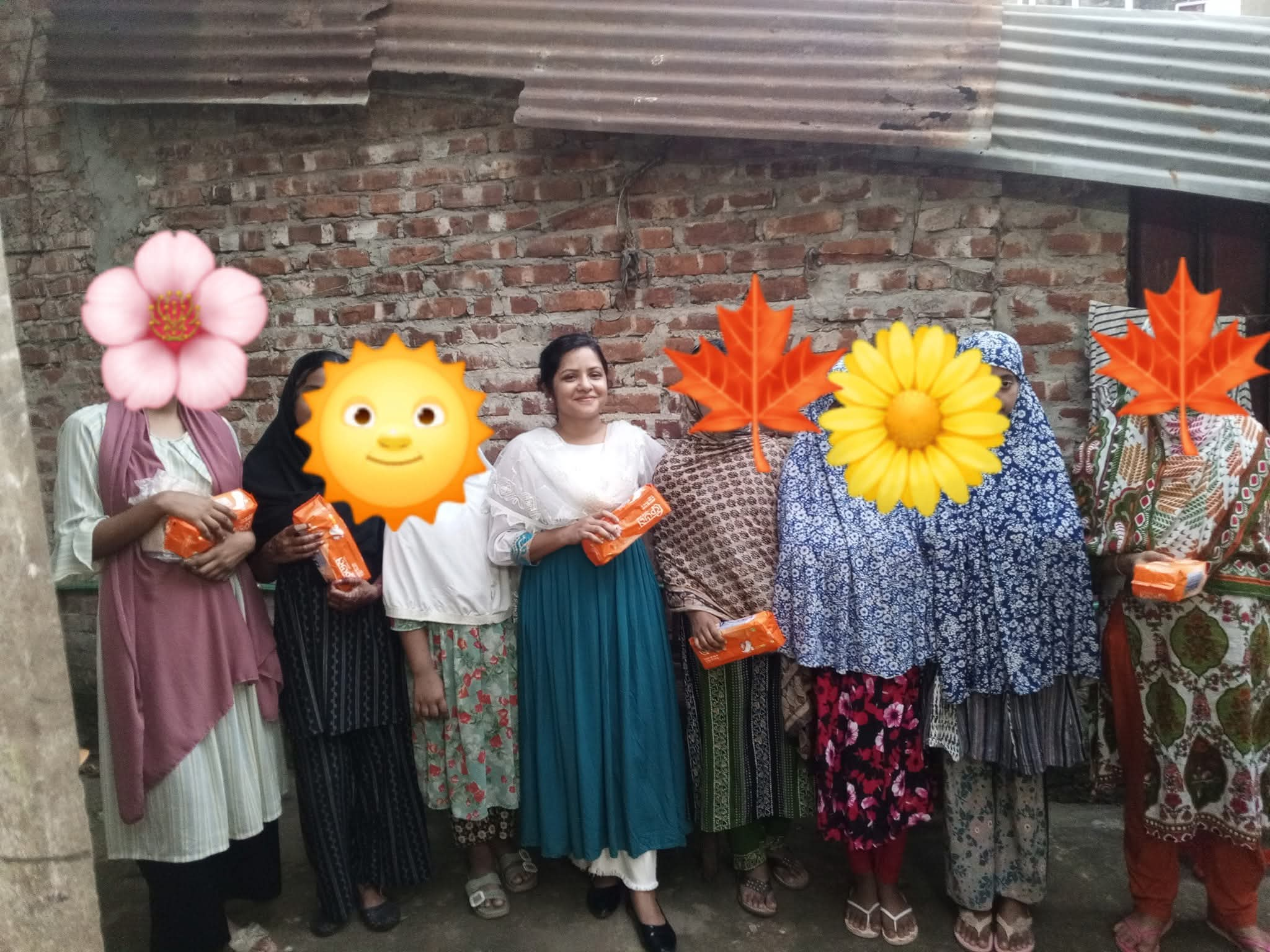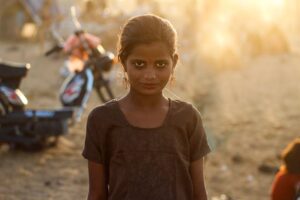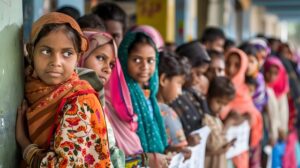Introduction
In Bangladeshi society, menstruation is still seen by many as a secret and forbidden topic. Yet it is a completely natural and biological process—an essential part of every adolescent girl’s and woman’s body. Still today, society holds on to superstitions like “you can’t talk during this time,” “it’s shameful,” or “girls are impure during this time.”
This culture of shame and silence not only affects women’s bodies but also violates their basic human rights—the Right to Dignity, the Right to Health, and the Right to Education. When a girl stops going to school because of her period, or when she has to manage it in unhealthy ways, an invisible barrier forms in her mental and social development.
I also grew up in a family where financial struggles were part of daily life. I know very well how confusion, fear, and lack of information about menstruation cause suffering for young girls. Because I was one of them. More importantly, in most underprivileged families, girls are not taught about this from a young age. So when a girl suddenly gets her first period, many become scared and tell no one, thinking they have a serious disease. I faced the same problem myself. My mother was a village woman who never went to school, so she had no knowledge about it. Out of shame, she never spoke to me about it.
When I first got my period at school, I cried a lot. One of my teachers explained it to me. But not every girl in our country goes to school, so many remain unaware. That experience taught me—“Human rights are not just laws; they are about human dignity.”
From that realization, I went to a slum area in Chattogram to talk with adolescent girls. I distributed free sanitary napkins and spread awareness about menstrual hygiene. To me, this small effort was not just a charitable act—it was the real practice of Menstrual Equity, where every girl can accept her body safely and with dignity.
The Real Problem: Lack of Awareness as the Biggest Barrier
Every day, hundreds of girls grow up in the slums of Chattogram, where education, health, and awareness opportunities are very limited.
According to statistics, 95% of women and 90% of adolescent girls
use rags during menstruation, and 41% cannot attend school during that time. Many girls consider the menstrual period to be an illness and due to the lack of awareness, about 85% students use old clothes during menstruation, only 36% know about menstruation before menarche (the first occurrence of menstruation), reveals a survey conducted recently in Bangladesh The Daily Star.
According to the World Health Organization (WHO), around 500 million women and girls worldwide are deprived of safe menstrual management—this is not just a health issue, but a global human rights crisis.
Many girls in slums still use old cloths or dirty cotton pieces, which can cause infections, skin problems, and even reproductive diseases.
Besides physical pain, they suffer mentally—they lose confidence, skip school, and become socially isolated.
Superstitions make the problem worse. In many places, girls are told they are “impure” during this time, so they can’t enter the kitchen or join religious activities. Some are told, “If you eat fish, you’ll get sick.” Such false beliefs create fear in their minds.
As a result, menstruation becomes a silent pain, deeply affecting their mental health. Anxiety, guilt, and low self-esteem haunt them from childhood.
When I studied these issues and remembered my own experiences, I realized—“To break this cycle, we must speak up, with courage and compassion.”
How My Initiative Started and Worked
My small initiative started one simple afternoon in a slum in Chattogram. With a little saved money and help from a few friends, I bought some sanitary napkins and went there. At first, many people looked at me suspiciously, thinking I came to sell something.
I first spoke to the mothers of the girls. I explained that I came to talk about something every girl has the right to know about—it is not a matter of shame.
My tone and sincerity slowly gained their trust. Some girls came and sat down—some quietly, some with curious eyes.
I began by saying, “Menstruation is not shameful, it’s a natural change in every girl’s life.” Then I explained in very simple language—
Why periods happen, the physical process, how long it lasts, how to use sanitary napkins, their benefits, cost, where to find them, how to dispose of them, and how often to change them. I also explained what problems can occur if cloth is used.
I told them what foods should be eaten during this time. I explained how to understand from the type, color, and duration of bleeding if everything is normal. I advised them to go to Surjer Hashi Clinic or any healthcare center if the period lasts too long, or if there’s abnormal flow or pain. I told them not to take painkillers or medicines to stop periods on their own. I made them understand that menstruation is not something to fear—it’s a natural process.
I didn’t just give information—I listened to their words too.
One girl said, “Apu(Sister), I don’t go to school during this time because it feels dirty.”
Another said, “My mother says if I go out, something bad will happen.”
Then I told them—“Your body is not bad. During this time, you are even stronger because you have the power to carry life.”
The talk soon turned into an interactive class. I showed them small charts explaining how the menstrual cycle works and taught them the importance of washing hands. At the end, I gave each of them a free pack of sanitary napkins.
To me, this was a moment of empowerment—because in their hands, the napkin was not just a health product, but a tool of confidence and freedom.
At first, the girls who looked down while talking started smiling and asking questions later. Their curiosity was a sign of hope for me.
One 13-year-old girl said—
“Apu(Sister), now I will go to school, and I won’t feel ashamed anymore.”
Her words touched me deeply. Because that small change is the true success of human rights awareness.
Menstrual health is not just personal health—it is closely linked with Gender Equality and Human Dignity.
When society creates shame and superstition around women’s bodies, it becomes a form of Gender-Based Discrimination.
My initiative directly connects with the United Nations Sustainable Development Goals (SDG)—
SDG 3: Good Health and Well-being
SDG 5: Gender Equality and Women Empowerment
This awareness activity not only increased girls’ knowledge about health but also boosted their mental strength and self-respect. They learned—
“We are not shameful—we are the bearers of life.”
Future Plans and Sustainability
This experience made me stronger. Now I plan not only to distribute napkins but also to organize regular workshops in slums and schools in Chattogram, inviting both girls and their mothers.
They will be taught how to sew reusable cloth pads so they can make their own products—this will be both eco-friendly and economically sustainable.
I want this work to grow into a permanent program where local girls will train others—creating a community-based leadership cycle (Grassroots Leadership Cycle).
At the same time, I want this kind of initiative to become part of policy advocacy at government and NGO levels—so that menstrual hygiene products are provided free or at low cost for all girls.
Leadership and Education: My Next Step
This experience has taught me that real social change needs not only empathy but also education and research-based leadership.
I want to pursue higher education in Human Rights so that I can turn my practical experience into effective models for policymaking, women’s health, and social change.
My dream is that one day, every girl in Bangladesh will have access to safe menstrual health care—no one will hide in shame but care for her body with pride and belief in her rights.
Conclusion
That afternoon in Chattogram might have been an ordinary day in my life, but after seeing those girls smile, I realized—change always begins with small, brave steps.
The girls I met may still be struggling, but in their eyes, I saw a light—the light of self-respect.
I believe—
“Human rights are not just policies; they are the practice of humanity.”
This work has taught me that if every conscious person takes one step to solve a single problem around them, the world will not take long to change.
My journey is the beginning of that change—from one girl to another, from one heart to another.




